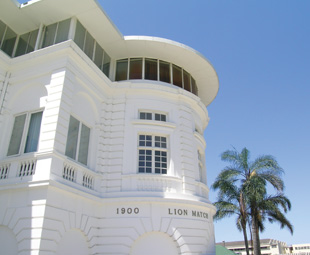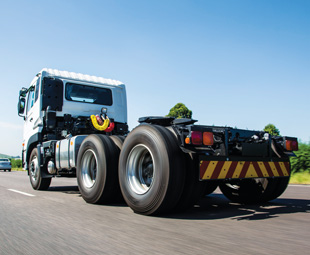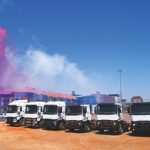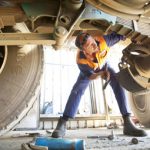Dunlop’s R1,1 billion African dream

Another year has rolled by and 2014 is almost at an end … This has certainly been a busy time for the Dunlop brand as it “moved house”, set itself up – with a R1,1 billion investment – to conquer the African continent and is getting ready to take 2015 by storm with its new range of Truck Bus Radial tyres.
It all began December 2013, when Sumitomo Rubber Industries Limited (SRI) acquired the manufacturing and distribution licence for Dunlop tyres in South Africa and 33 other African countries, from Apollo Tyres Limited. This led to the formation of Sumitomo Rubber South Africa (SRSA). SRI is the world’s fifth-largest tyre manufacturing company and has headquarters in Japan.
“Market access played a significant part in SRI’s decision to acquire the Dunlop rights,” explains SRSA CEO Riaz Haffejee – adding that SRI wanted to have the Dunlop rights for Africa. (It already owned the trademark in 20 countries on the continent.) “So, when SRI puts the two together, it owns the brand rights for the entire continent.”
Haffejee adds that SRI, like every other multi-national, covets Africa for its growth potential. “It’s really the last outpost of growth left in the world.”
Sumitomo puts its shoulder to the wheel
“Now we are part of a global family,” Haffejee points out. “We are factory number 11 and the 83 000 km2 factory in Ladysmith is still growing.”
 Haffejee emphasises that, for this reason, SRI is going to invest R1,1 billion into the Ladysmith factory, over the next three years, to support its original equipment business and African expansion. “We are going to put a great deal of money and effort into making sure that we are the leading tyre company on the continent in the next few years.”
Haffejee emphasises that, for this reason, SRI is going to invest R1,1 billion into the Ladysmith factory, over the next three years, to support its original equipment business and African expansion. “We are going to put a great deal of money and effort into making sure that we are the leading tyre company on the continent in the next few years.”
The investment includes plans to initiate local production of the Sumitomo Tires’ brand as well as range extensions and quality enhancements to the Dunlop brand. These new ranges will require significant technological enhancements and physical expansion to the 41-year-old plant.
SRSA has also invested significantly in its Ladysmith-based workforce and has included multiple stakeholders in a structured programme to promote unity, productivity and motivation of the workforce in line with the expansion plans. “The Ladysmith plant is set to undergo significant changes over the next 18 months, and we really wanted our employees to feel part of this process and to be excited by the expansion,” explains Haffejee.
He adds: “The community is important for us. Ladysmith is a small town, so we are close to the community, and we want to get closer. We have to support our employees as much as possible. That isn’t the reason for investing, but it has to work hand in hand.”
This latest investment definitely is an indication of the company’s commitment to growing its business in South Africa, boosting the quality of the company’s products and ongoing improvement of its range offering to consumers.
“The Dunlop brand already has a strong consumer loyalty base in South Africa, and is instantly recognisable throughout Africa, having recently taken top place in the TGI Brand Icon Survey 2013/14 for the third consecutive year,” says Haffejee, who goes on to elaborate: “First introduced into the country in 1935, when Dunlop Limited opened its Durban factory and subsequently the Ladysmith factory in 1973, Dunlop has since gone on to build an impressive track record of achievements in this country and around the world.”
 At a time when the industry faces challenges from high manufacturing costs, tough labour relations and competition from imported tyres, SRSA is still confident in making the investment and has taken a long-term view of the South African motor industry and potential of the African tyre market.
At a time when the industry faces challenges from high manufacturing costs, tough labour relations and competition from imported tyres, SRSA is still confident in making the investment and has taken a long-term view of the South African motor industry and potential of the African tyre market.
Putting some new rubber on the road
The company also wanted a higher performance level from its products, so it has decided to switch to a new range of imported TBR tyres, come January 2015. “We wanted a stable supply, supported by a global footprint and we wanted tyres that sported the latest SRI technology,” says Haffejee.
This is in line with the company’s efforts to promote advanced fleet management services and increase the variety of top-quality products from its stable, as well as offer a more environmentally friendly tyre.
Haffejee adds that, out of the 11 factories across the globe (in Asia, Europe and Africa), three of SRI’s plants manufacture Dunlop TBRs. “In total, between the three, they can make about 13 500 units per day, so the company’s capacity for truck tyres is very good.”
As for the SRI technology, Haffejee adds that the big-volume-sales tyres (20 out of the 42 SKUs that will be imported), will come with Dunlop Energy Controlled Technologies (DECTES). “It controls the heat energy, the contact patch and the energy loss, which results in higher mileage and lower rolling resistance.”
 According to the SRSA CEO, the new range delivers some remarkable results. “We did an internal rolling resistance experiment and the new TBR range outperformed the benchmark competitive product.”
According to the SRSA CEO, the new range delivers some remarkable results. “We did an internal rolling resistance experiment and the new TBR range outperformed the benchmark competitive product.”
The DECTES technology also improves fuel efficiency, prolongs original tread life and promotes slow, even wear for better retreadability. “Our results on the controlled tyres have been remarkable,” says Haffejee. “We’re excited about bringing in a range of tyres that is going to give us a distinct performance advantage.”
Along with SRSA’s dedicated In-Field Technical Services team, for on-the-ground support and ongoing research and development, the company is confident that this range application will serve as an asset to any fleet management company.
Rounding it up
SRSA is braving new territories as it aims to change the company for the better. “We have to lead this industry. We have a huge opportunity in manufacturing and retail in South Africa and on the rest of the continent,” says Haffejee.
SRSA is certainly rolling full steam ahead. Its latest investment shows the company’s confidence in growing its business in Africa, while focusing on fleet customers with its pending new range of TBR tyres.
The company is sure that these investments will have a hugely positive effect on the country’s tyre industry and local employment, and will serve to facilitate the company’s future growth and development on the African continent.
Published by
Focus on Transport
focusmagsa




